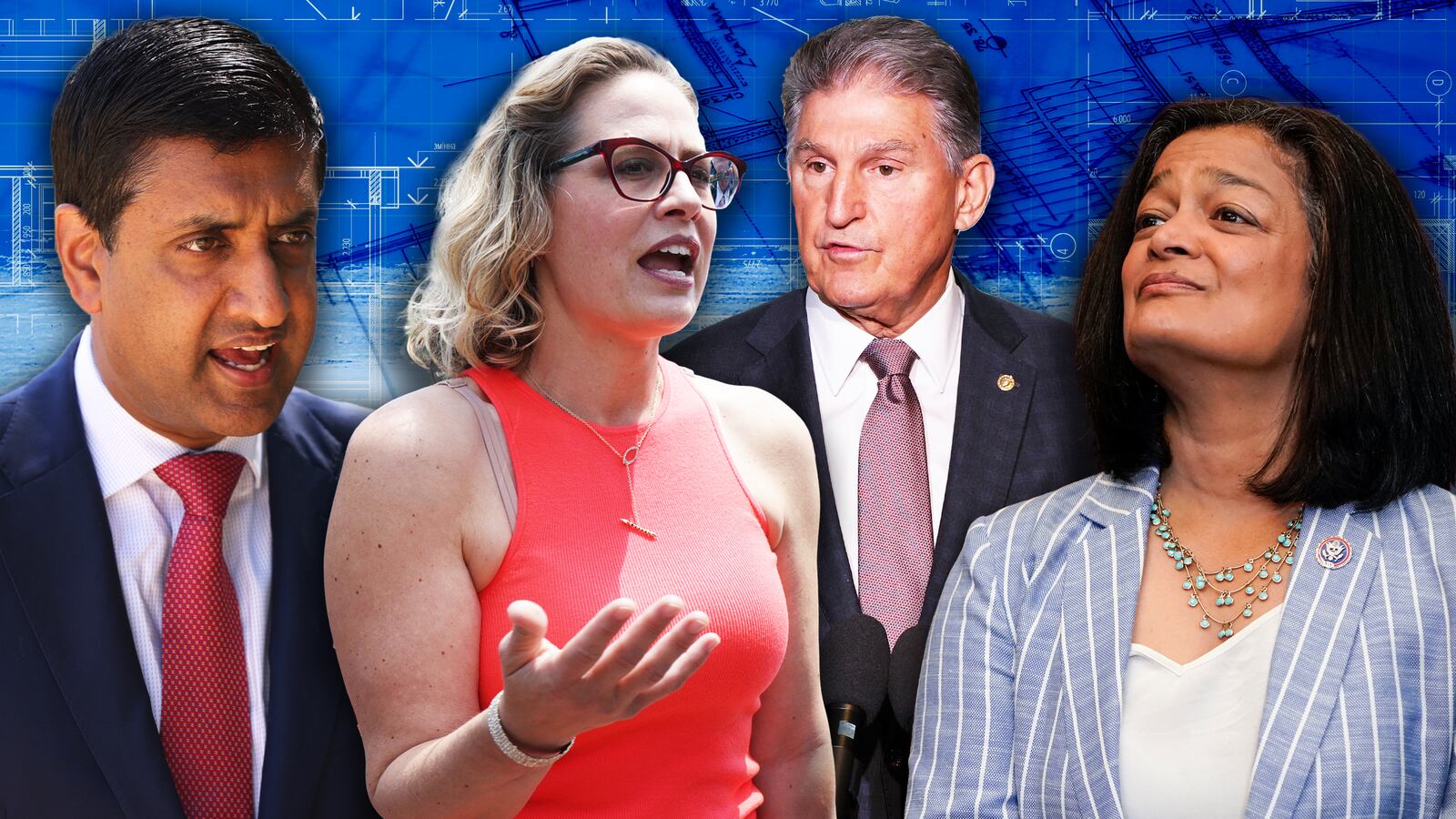Democrats promised to Build Back Better in the Joe Biden era, but the political reality surrounding their marquee policy package is forcing them to pick between two far more diminished mantras: Do Less Better, or Do More Worse.
Over the summer, Democrats laid the groundwork for a sprawling $3.5 trillion bill that would substantially fund a number of their top priorities, from expanding Medicare to include dental and vision benefits, to implementing aggressive new climate change measures, to making community college tuition free and pre-K universal.
But a group of centrists are objecting to the size and scope of that proposal, and with Democrats unable to lose a single vote in the U.S. Senate, lawmakers are moving toward a smaller package that could end up investing $2 trillion less than what leaders set out to.
That prospect sets up painful decisions for Democrats, particularly progressives, about which items to prioritize and which to table. But it’s also sparking a broader debate that is scrambling factional lines within the party—and could complicate the unified front that has made the progressive wing an effective force in negotiations so far.
The more moderate wing of the party prefers the Do Less Better mantra: pick a set of programs that are most vital and give them piles of long-term funding, with the goal of creating stable and successful initiatives that Democrats can campaign on for years. That would likely encompass things like making the child tax credit permanent and implementing universal paid leave.
Progressives, meanwhile, largely prefer the Do More Worse approach—though they probably would not call it that. They believe they now have a rare opportunity to enact the sweeping legislation voters elected them to pass and must maintain the vast scope of the legislation, even if they can only fund much of it for a short time.
Some lawmakers are convinced that these programs will be so popular that it could help keep the party in power, or at least make it near-impossible for the GOP to repeal them. Rep. Ro Khanna (D-CA), a leading progressive, has proposed that funding for key programs run out after the 2024 presidential elections, enabling the party to put them “on the ballot” that year.
“I am confident that by ’24, these programs would have proved very popular,” Khanna told The Daily Beast.
Others look at recent history and don’t see that fight going their way. They feel that Republicans would gladly run against these programs, and either way worry that GOP control of Congress or the gridlock of divided government would ensure that Democrats’ signature bill is dismantled in just a few years.
“The wisdom that popular policies will inevitably be extended is largely untested in this political climate,” said one progressive advocate. “And even if you believe it, it depends on things being implemented before the midterms or the general.”
In general, there’s some trepidation among even solid progressives about the risks involved with the caucus’ official approach. “A mile wide and an inch deep is not a very durable approach,” said Rep. Jared Huffman (D-CA), who added that Democrats are “on the horns of a dilemma.”
That dilemma comes as the White House and congressional leadership aim to close in on a deal that gets all Democrats on board with the legislation by the end of October. And this upcoming round of complex, high-stakes talks is set to challenge progressives’ most valuable resource so far: their unity.
At the end of September, Progressive Caucus Chair Pramila Jayapal (D-WA) and her team kept dozens of liberal lawmakers in line on a threat to tank a $1 trillion bipartisan infrastructure bill—if it weren’t paired with significant progress on the larger package. On Oct. 1, Biden came to the Hill and personally affirmed that position during a caucus-wide meeting, delivering progressives a huge win.
“The strength of the progressive caucus has been an unusual stretch of unity over these past few months,” said Huffman.
The nature of this debate, however, is more complicated than the infrastructure standoff. The vast legislation at hand consists of dozens and dozens of smaller proposals that some lawmakers have championed their entire careers, not to mention the varying constituencies and advocacy groups that wield enormous power in the Democratic coalition.
Progressive Caucus leaders said the ongoing debate amounts to a “false choice,” insisting that lawmakers can reach a broad segment of the population with well-funded programs. But multiple Democrats worried that the fight over how to shave as much as $2 trillion from the legislation could pit lawmakers against one another as they scrap to save their own personal priorities or those of their allies.
“The challenge here is that there are different flavors of that unity—some people are there for one or two issues that they’re just extremely passionate about,” Huffman said. “Others are there for a broader suite of priorities. And when you face a dilemma like this, none of us want to throw each other under the bus, but something’s gotta give.”
Rep. John Yarmuth (D-KY), the chairman of the House Budget Committee, said “It is really like dealing with all of your children—all of these things are long-standing Democratic priorities.”
Progressive aides say that the majority of members have coalesced around a framework, which was voted on in April, on the areas where they’d fight hardest in this package: child and family care, affordable housing, Medicare expansion and prescription drug cost reductions, climate change, and immigration reform.
Key Democrats also say that the potential for compromise is far greater than on the zero-sum infrastructure gambit in September. “The matrix of the possibilities is pretty large right now,” Yarmuth said.
Still, progressives still have moderates as a foil to build unity in their ranks around the do-more approach. For many Democrats, not just those on the left, there’s immense frustration at a handful of these lawmakers—chiefly Sens. Joe Manchin (D-WV) and Kyrsten Sinema (D-AZ)—for their posture in negotiations.
It’s not just that plenty of lawmakers oppose Manchin and Sinema on the merits of their support for giving the legislation a significant cut. They are also practically tearing their hair out over the lack of a counter-proposal from the duo, and the suggestion—at least from Sinema—that her colleagues are not owed an explanation of where she stands.
In the vacuum, progressives worry that they will race to decide what to cut and what to keep before they even know what size legislation they are working with. “There’s no reason for progressives to do their work for them or negotiate against ourselves in the meantime,” said Leah Greenberg, co-founder of the progressive group Indivisible, which has organized behind the Progressive Caucus’ position.
Last week, Sen. Bernie Sanders (I-VT) told reporters that it was long past time for Manchin and Sinema to say what level of funding they would support, as negotiations drag on with the White House. “We are prepared to negotiate, we are prepared to compromise, but we are not going to negotiate with ourselves,” Sanders said.
Sanders soon upped the ante by publishing an op-ed in the pages of West Virginia’s biggest newspaper making the case for the full $3.5 trillion in investments through the legislation. Manchin fired back shortly after, saying he would continue to resist what he called a “reckless expansion of government programs.”
“No op-ed from a self-declared Independent socialist is going to change that,” Manchin said.
Many progressives hope that Biden will be active here, believing his involvement during the infrastructure standoff kept their goals alive. “There are all sorts of ways a fully engaged White House can help hold this together,” Huffman said.
But the White House is largely using the same playbook as it did during previous negotiations over the size and scope of the economic packages—drawing no red lines on any specific proposals beyond not raising taxes on individuals making less than $400,000 per year.
Negotiations, White House officials have told reporters, are nearly always messiest in the home stretch of major legislation, and even instituting an artificial timeline for passing either bill is seen as risking the trillion-dollar remake of the American economy.
“This is a critical time, and we’re gonna continue to get things done,” principal deputy White House press secretary Karine Jean-Pierre told reporters aboard Air Force One on Friday, calling the ongoing negotiations between progressives and moderate holdouts “part of the democratic process.”
From a messaging standpoint, the White House has publicly emphasized the popularity of many components of the packages, from the child tax credit to the government negotiating prescription drug prices. But there is increasing pressure from fellow Democrats for the White House to push for passing something—anything—in order to secure a win, regardless of whether those popular provisions are able to survive the negotiation process.
“The administration needs some points on the board,” a former staffer in Biden’s Senate office told The Daily Beast. “You can’t expect House Democrats to run re-election campaigns on the message that we proposed all these popular things and they never happened, but we still believe in them! Just pass something and claim victory.”
Addressing similar concerns from Sen. Mark Warner (D-VA), who told The Washington Post that House Democrats should just pass the “hard” infrastructure bill in order to shore up support for Terry McAuliffe in Virginia’s upcoming gubernatorial election, White House press secretary Jen Psaki framed the legislative pushmi-pullyu as a simple math problem.
“The president wants to get both pieces of legislation passed,” Psaki said on Thursday. “That requires having the majority of votes in Congress to get that done, and that’s what he's working to get across the finish line.”
Ultimately, that outlook is shared by many on the Hill. Many Democrats feel that the best bill they can craft is the one that can actually pass, which will require 218 of 220 House Democrats to vote yes.
Ensuring that every faction—even every member—is able to say that their priority is funded, even if for a short time, could bring the legislation over the finish line, said one senior Democratic aide.
“This isn’t, like, who’s right and who’s wrong,” said the aide. “It’s how you get to 218.”




